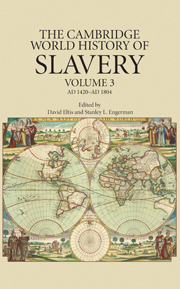Book contents
- Frontmatter
- Contents
- List of Maps, Figures, and Tables
- Contributors
- Series Editors' Introduction
- 1 Dependence, Servility, and Coerced Labor in Time and Space
- PART I SLAVERY IN AFRICA AND ASIA MINOR
- 2 Enslavement in the Ottoman Empire in the Early Modern Period
- 3 Slavery in Islamic Africa, 1400–1800
- 4 Slavery in Non-Islamic West Africa, 1420–1820
- 5 Slaving and Resistance to Slaving in West Central Africa
- 6 White Servitude
- PART II SLAVERY IN ASIA
- PART III SLAVERY AMONG THE INDIGENOUS AMERICANS
- PART IV SLAVERY AND SERFDOM IN EASTERN EUROPE
- PART V SLAVERY IN THE AMERICAS
- PART VI CULTURAL AND DEMOGRAPHIC PATTERNS IN THE AMERICAS
- PART VII LEGAL STRUCTURES, ECONOMICS, AND THE MOVEMENT OF COERCED PEOPLES IN THE ATLANTIC WORLD
- PART VIII SLAVERY AND RESISTANCE
- Index
- References
4 - Slavery in Non-Islamic West Africa, 1420–1820
from PART I - SLAVERY IN AFRICA AND ASIA MINOR
Published online by Cambridge University Press: 28 September 2011
- Frontmatter
- Contents
- List of Maps, Figures, and Tables
- Contributors
- Series Editors' Introduction
- 1 Dependence, Servility, and Coerced Labor in Time and Space
- PART I SLAVERY IN AFRICA AND ASIA MINOR
- 2 Enslavement in the Ottoman Empire in the Early Modern Period
- 3 Slavery in Islamic Africa, 1400–1800
- 4 Slavery in Non-Islamic West Africa, 1420–1820
- 5 Slaving and Resistance to Slaving in West Central Africa
- 6 White Servitude
- PART II SLAVERY IN ASIA
- PART III SLAVERY AMONG THE INDIGENOUS AMERICANS
- PART IV SLAVERY AND SERFDOM IN EASTERN EUROPE
- PART V SLAVERY IN THE AMERICAS
- PART VI CULTURAL AND DEMOGRAPHIC PATTERNS IN THE AMERICAS
- PART VII LEGAL STRUCTURES, ECONOMICS, AND THE MOVEMENT OF COERCED PEOPLES IN THE ATLANTIC WORLD
- PART VIII SLAVERY AND RESISTANCE
- Index
- References
Summary
INTRODUCTION
Slavery was an ancient institution known to have been widespread in the Old World. As a part of the Old World, therefore, African societies practiced slavery; it would have been an anomaly if slavery did not exist on the continent. The Bible's Old Testament points to the existence of slavery in Africa, given that Joseph and his fellow Israelites were enslaved in Egypt before their escape (Exodus). Slavery existed in Christian Ethiopia in the fourth century AD. The evidence for the antiquity of slavery in West Africa is not as clear-cut, but it is clear enough that slavery existed alongside various forms of servility in parts of the region well before the fifteenth century, when the Europeans arrived there via the Atlantic Ocean. The question to address, then, is not whether slavery existed in West African societies, but how extensive it was and when it assumed significance in the political economies, as well as its extent, character, and dynamics. The transatlantic trade that ensued with European arrival at the west coast from the fifteenth century onward marked a watershed in the development of slavery in West Africa. Slaveholding in the region spread and intensified during the following four centuries.
- Type
- Chapter
- Information
- The Cambridge World History of Slavery , pp. 81 - 110Publisher: Cambridge University PressPrint publication year: 2011
References
- 5
- Cited by



